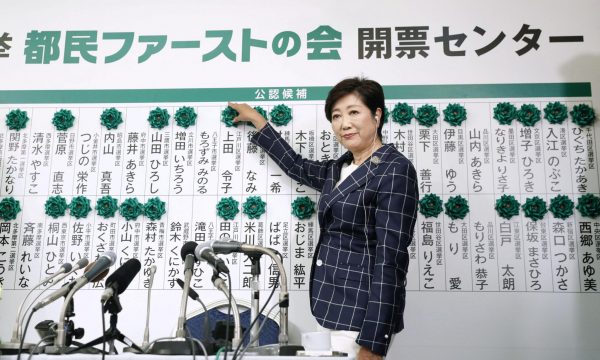The winner in the election was a new party, Tokyoites First (TF), founded in 2016 and led to victory by Tokyo Governor Yuriko Koike. TF significantly increased its seats in the election from six to 49 and, after bringing six independent winners into its fold, now forms the largest party in the assembly.
Local assembly members in Japan have traditionally been trailblazers on quality of life issues, whether advocating for anti-pollution and environmental measures, welfare entitlements or marriage rights for same-sex couples. In that sense, TF is no different.
TF promises to resolve Tokyo’s day care crunch, realise a smoke-free environment, improve earthquake resistance and rectify the problem of overwork. Many of its promises overlap with ones the national government has struggled to advance against opposition from interest groups, which wield disproportionate influence over policy in Japan’s upper house.
While TF has big plans to improve the everyday lives of Tokyoites, the significance of the party’s victory lies in its implications for government at the national level.
The election affirmed an appetite among voters for a rival to the LDP. Since 2013, the LDP has utterly dominated national politics. It has maintained majorities in both houses of the Diet and enjoyed support ratings vastly in excess of all other parties.
Given that the LDP has won pluralities in 19 of the last 20 lower house elections, one could be forgiven for thinking, as an LDP Diet member asserted in a recent interview, that the ‘Japanese people just like the idea of one dominant party’. On the contrary, this election suggests that LDP dominance rests upon the absence of a credible alternative. When one appears, large numbers of voters will consider voting for it.
It’s tempting to dismiss the result on the grounds that local assembly elections bear little resemblance to and carry few implications for National Diet elections, or that the election simply caught the LDP at a ‘bad time’. Both conclusions are unwarranted.
If anything, candidates for local assemblies have even more incentive to affiliate with the ruling party than candidates for the Diet.
Because local assembly members compete in multi-member electoral districts with large numbers of seats up for grabs, they face lots of competitors and need smaller vote shares to win. This gives them incentives to campaign on promises targeted to residents who live in certain areas of their district. And because a portion of the financial resources needed to match these promises are concentrated in the hands of the central government in Japan, it makes sense to ally with the party controlling the purse strings. In return for money, local assembly members campaign on behalf of the party’s Diet members in national elections.
While cities like Tokyo have considerable financial resources of their own, it is still remarkable that so many candidates and voters chose to cast their fate with TF, a party that lacks representation at the national level. It could even be read as a lack of confidence that the LDP will retain power, which could become a self-fulfilling prophecy as fewer LDP-affiliated assembly members means fewer people to staff the campaigns of LDP Diet members.
As for it being a ‘bad time’ for the LDP, it is true that the election came on the heels of two major scandals involving school operators friendly with Prime Minister Abe and his wife, gaffes by Minister of Defense Tomomi Inada, and a much publicised video of a second-term LDP Diet member abusing her secretary. But the fact is that Koike saw the opportunity to challenge the LDP a little over a year ago, at the same time as the LDP–Komeito coalition was cruising to victory in an upper house election.
The coup in Tokyo politics over the past year — beginning with the LDP-affiliated Koike resigning from the Diet, campaigning for governor against the wishes of the party’s Tokyo branch, and then creating a party capable of wresting control of the assembly from the LDP — reads as a genius, albeit risky, means of building the name recognition and popularity necessary to become prime minister. While the LDP needs a post-Abe leader, the power it concentrates in the hands of its current leadership reduces the incentive for anyone aspiring to the position to do anything other than curry favour.
Koike may have alighted on a safer way to build the name recognition required to be seen as a potential leader by Diet members. But does she want to run?
In a 13 June meeting with the US–Japan Network for the Future, Koike assured us her sights were set on representing Tokyoites. But over the past year, she has demonstrated an extraordinary capacity to maintain a high approval rating as governor while forging a relationship with the Komeito and recruiting, nurturing and convincing voters to support talented candidates. She has kept herself in the headlines with her platform of challenging entrenched interests and has carved out policies that could hold appeal beyond Tokyo.
If Koike can make Tokyo’s 2020 hosting of the Olympics a success and parlay that into even higher visibility, she may well find herself the most attractive candidate for prime minister, whether for the LDP or another centrist party.
Amy Catalinac is an Assistant Professor in the Department of Politics at New York University.


While Koike may have been able to appeal to a large number of voters in Tokyo, can she or her TF party do the same for voters in other cities? And how about with rural voters who have been strongly supportive of if not beholden to the LDP? Three years (until 2020) is a very long time in the world of politics. Ie, a lot will happen.